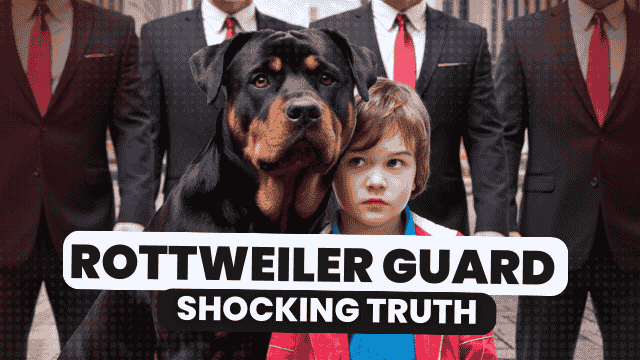Rottweiler guard dogs: Key takeaways
-
Rottweilers are natural protectors: Their history as working dogs has instilled strong guarding instincts.
-
Responsible ownership is essential: Training, socialization, and a secure environment are crucial for a well-adjusted Rottweiler.
-
Temperament matters: Not all Rottweilers are suited to be guard dogs; look for confidence, alertness, and control.
-
Rottweilers are versatile: Beyond guarding, they can excel in various roles like service dogs, therapy dogs, and obedience competitors.
Rottweilers… those big, strong pups with a reputation for being top-notch protectors, right? And guess what? That reputation is totally earned! But before you picture yourself with a Rottweiler sidekick fighting off bad guys, let’s dive into what it really takes to have a Rottweiler guard dog. Because it’s not all about fierce loyalty and impressive barks (though there’s plenty of that!).
This guide is your one-stop shop for everything Rottweiler guarding – from their natural instincts and training needs to responsible ownership and things you absolutely need to consider. Whether you’re looking for a loyal protector for your home and family, or just curious about this powerful breed, we’ve got you covered!

So, is a Rottweiler the Right Guard Dog for YOU?
- While Rottweilers can be amazing family dogs and protectors, it’s crucial to acknowledge that they have been involved in bite incidents. According to the American Veterinary Medical Association, tens of millions of people are bitten by dogs each year in the United States, and certain breeds, including Rottweilers, are often overrepresented in these statistics. This highlights the critical importance of responsible ownership, training, and socialization to ensure the safety of both your Rottweiler and those around them.
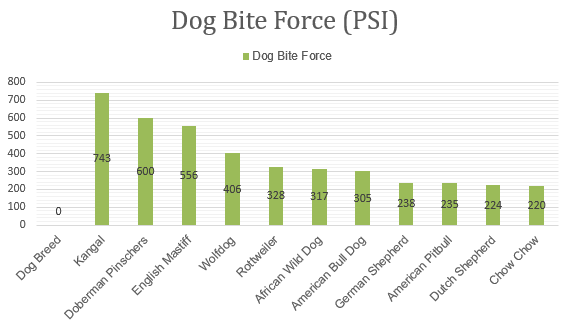
- While Rottweilers are known for their powerful bites, they are not at the top of the list when it comes to bite force. Their bite force is around 328 PSI, according to Dr. Brady Barr’s National Geographic documentary “Dangerous Encounters“. For comparison, Kangal dogs have a bite force of 743 PSI, Doberman Pinschers have a bite force of 600 PSI, and English Mastiffs have a bite force of 556 PSI. It’s important to remember that bite force is just one factor to consider when evaluating a dog’s potential for harm. A dog’s temperament, training, and the specific circumstances all play a significant role.
- Rottweilers have a history that goes way back – we’re talking ancient Roman times! Back then, they were herding livestock and watching over their humans. That instinct to protect? Yeah, it’s basically built-in. They’re naturally alert, always keeping an eye out, and ready to spring into action if they sense trouble. Sounds awesome, right? It can be! But owning a Rottweiler guard dog is a big commitment, and not something to jump into lightly.
Rottweiler Guard Dogs: Born to Protect (But It's Complicated!)

- Think of it this way: Rottweilers come from a long line of tough pups who guarded cattle and kept their families safe. That kind of history gets passed down through generations! It’s like they’re born with “protector” written in their code.
- They’re often called “gentle giants” because they’re total sweethearts with their families, but they’re also strong and brave enough to defend them if things get hairy.
- But here’s the twist… Not every Rottweiler is meant to be a guard dog. It takes a special pup with the right mix of ingredients: confidence, alertness, and control. A confident Rottweiler won’t overreact out of fear, an alert Rottweiler is aware of their surroundings, and a Rottweiler with control will listen to your commands and only act protective when you tell them to.
Hold Up! Are Rottweiler Guard Dogs REALLY for You?
- Okay, so maybe you’re thinking, “Wow, a Rottweiler sounds amazing!” And they can be! But let’s be real, owning a Rottweiler guard dog is a big deal. It’s like signing up for a superhero training program, but for dogs.
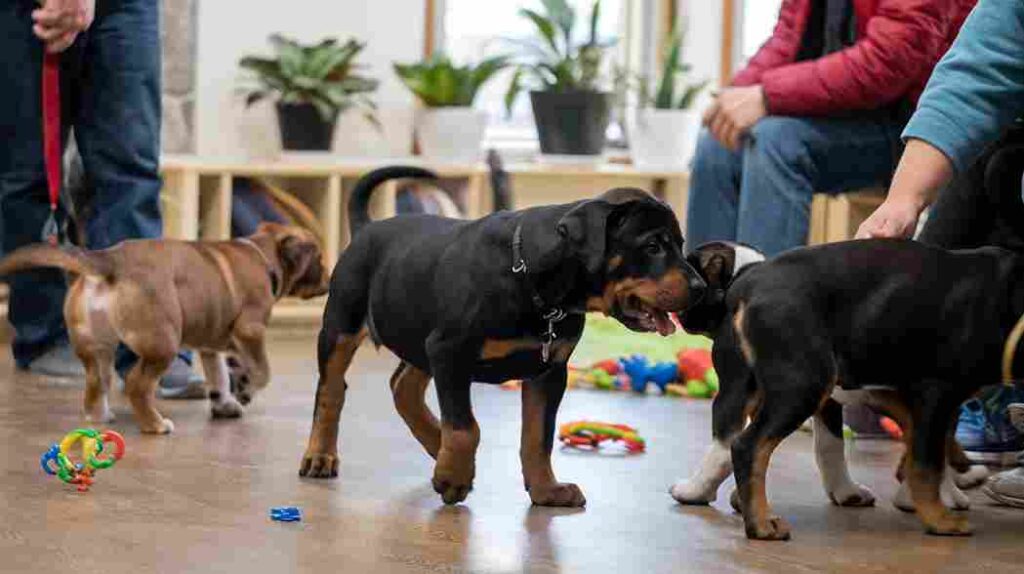
- Here’s the scoop: Training and socialization are your superpowers! This is how you teach your Rottweiler to be a well-behaved citizen and know the difference between a real threat (like a sneaky intruder) and everyday stuff (like the mailman). You’ll also need a secure fortress for your furry guardian – Rottweilers are strong, and their protective instincts mean you need a super strong fence and responsible handling. And remember, time and commitment are non-negotiable. These dogs need tons of exercise, mental stimulation (think puzzle toys and games), and ongoing training to be happy and healthy.
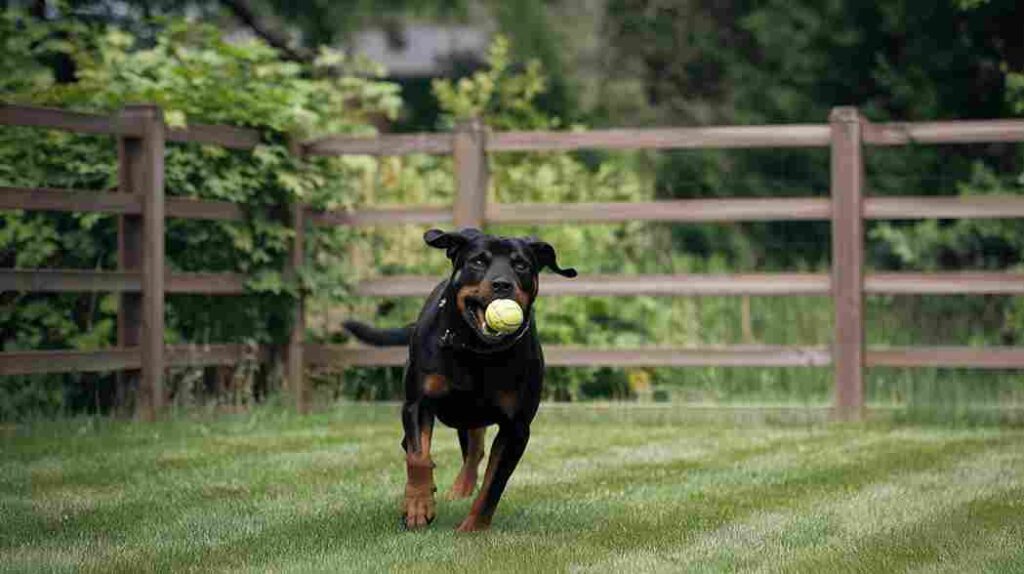
- So, before you jump in, ask yourself: Are you ready to take on the challenge? Because a Rottweiler isn’t just a pet; they’re a lifestyle.
Rottweilers and Kids: A Pawsome Pair?
You might be surprised to hear this, but Rottweilers can be total softies with kids! They often form super strong bonds with their families, even the littlest humans. But remember, supervision is always important, especially with young children, because Rottweilers are big and strong.
Busting the Rottweiler Myths
Let’s be honest, Rottweilers sometimes get a bad rap. People see their size and strength and assume they’re aggressive. But that’s just not true! With a responsible owner, proper training, and early socialization, Rottweilers can be loving, goofy, and amazing family members. It’s all about raising them right.
Guarding vs. Aggression: Know the Difference!
This is super important: guarding and aggression are two totally different things. A well-trained Rottweiler will show protective behaviors (like barking to let you know someone’s at the door) without getting all bitey. Training helps them understand how to react correctly and only act protective when it’s really needed. Think of it like teaching them to be a gentle giant with a watchful eye, not a furry wrecking ball!
Training and Socialization: Building a Well-Rounded Rottweiler
Training and socialization are like superhero school for your Rottweiler! They’re super important for any dog, but especially for those destined for guard dog duty. Think of it as giving your pup the skills and confidence to be a well-rounded, obedient, and reliable protector.
Socialization: The Puppy Party!
Early socialization is key to raising a confident and well-adjusted Rottweiler. It’s like throwing a giant puppy party with lots of different guests! Introduce your Rottweiler to a variety of people, places, and other animals. All this positive exposure helps your Rottweiler build confidence and learn to tell the difference between friend and foe.
Obedience Training: Learning the Ropes
Basic obedience training is like learning your ABCs – it’s the foundation for everything else, including protection work. Teach your Rottweiler essential commands like “Sit,” “Stay,” “Come,” “Heel,” and “Leave it.” These commands help you establish control and make sure your Rottweiler listens to your directions.
Specialized Protection Training: Guard Dog 101
Once your Rottweiler has aced basic obedience, you can think about specialized protection training. This usually involves teaching them to bark on command, stop barking on command, guard a specific area or person, and release a “threat” on command.
Important: Always work with a qualified professional for protection training. They’ll help you train your Rottweiler safely and responsibly.
The Best of Both Worlds: Protector and Pal
While you want your Rottweiler to be a top-notch guard dog, it’s just as important that they’re also a loving and happy member of your family. Keep showering them with affection, playtime, and positive reinforcement throughout their training. This helps them bond with you and understand that they’re both a protector and a beloved part of the family. It’s all about balance!
The Serious Side: Rottweilers and Bites
Okay, time for a reality check. Rottweilers are powerful dogs, and like any breed, they can bite. It’s important to be aware of this and take responsible ownership seriously.
While Rottweilers can be amazing family dogs and protectors, there have been cases of Rottweilers biting people. This often happens when:
- They haven’t been properly socialized or trained: A Rottweiler who hasn’t learned how to interact with people or other animals might react out of fear or aggression.
- They’re feeling threatened or stressed: Just like us, dogs can get stressed or scared, and they might bite if they feel cornered or in danger.
- They haven’t had clear boundaries set: If a Rottweiler isn’t taught what’s acceptable behavior, they might become overly protective or territorial.
This doesn’t mean all Rottweilers are dangerous! But it does mean that responsible ownership, training, and socialization are absolutely crucial. It’s like teaching your Rottweiler to be a well-mannered and responsible member of society – it keeps everyone safe and happy.
Rottweiler Ownership: Leveling Up to Responsibility
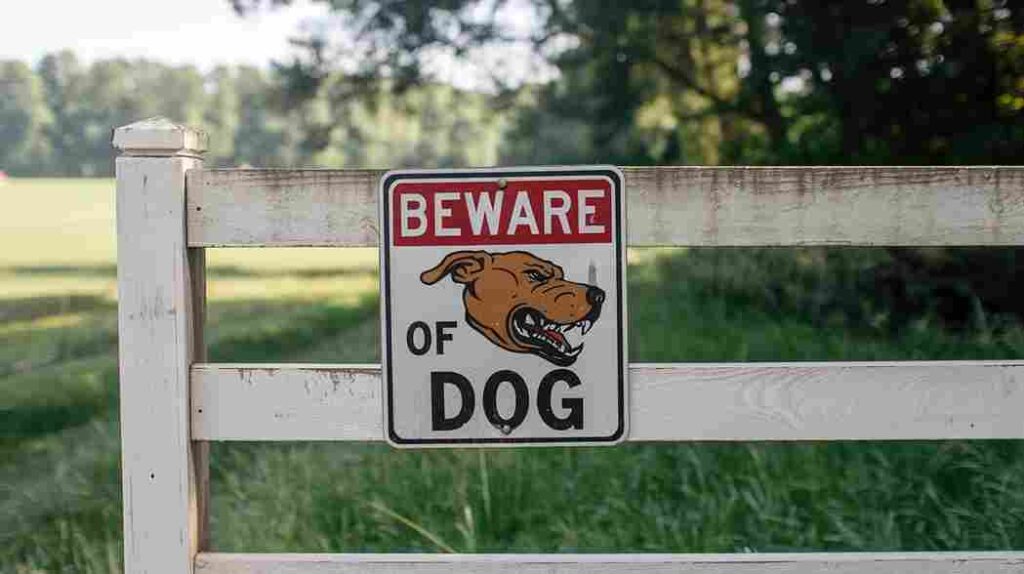
Being a responsible Rottweiler owner means taking your commitment seriously. Training is an ongoing adventure, and you’ll need to provide a secure environment for your strong and protective pup.
It’s unfortunate that Rottweilers are often unfairly targeted by breed-specific legislation (BSL), which are laws that restrict or ban certain dog breeds based on their appearance rather than their individual behavior. The ASPCA strongly opposes BSL and offers information on its negative impact on dogs, families, and communities.
Legal Stuff and Doing What’s Right in the USA
Okay, let’s talk about the legal side of things, especially in the good ol’ USA. Owning a guard dog, especially a Rottweiler, comes with some extra responsibilities.It’s unfortunate that Rottweilers are often unfairly targeted by breed-specific legislation (BSL), which are laws that restrict or ban certain dog breeds based on their appearance rather than their individual behavior. The ASPCA strongly opposes BSL and offers information on its negative impact on dogs, families, and communities
- Know the Rules: Different states and cities have different laws about dog ownership, and some even have specific rules for guard dog breeds. Do your homework and make sure you’re following the rules in your area. You don’t want any unexpected fines or legal trouble!
- “One Bite” Rule and Liability: In some states, there’s something called the “one-bite” rule, which basically means a dog owner might not be held responsible for the first time their dog bites someone (unless there were signs of aggression beforehand). But don’t rely on this! In many cases, you can still be held responsible for any injuries or damage your dog causes, even if it’s their first offense. It’s always best to be prepared and prevent any incidents from happening in the first place.
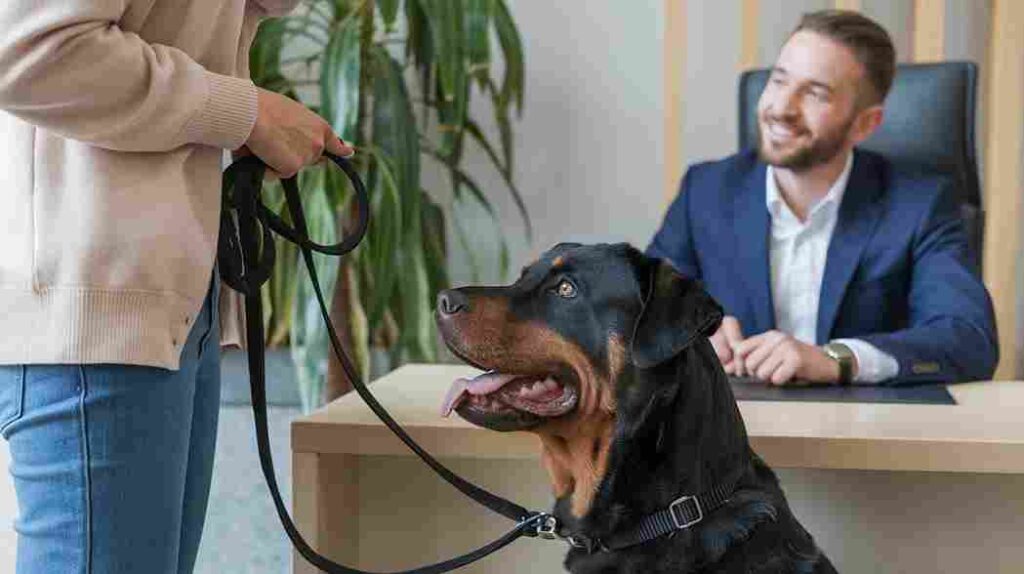
Insurance and Legal Things to Keep in Mind
Some insurance companies might have special rules or higher costs for Rottweiler owners. Talk to your insurance provider to understand their policies and make sure you have the right coverage. Also, be aware of any breed-specific legislation in your area that might affect your Rottweiler ownership.
-
Important Note: Never ever encourage or train your Rottweiler to attack or bite without a really good reason. Safety and responsible handling should always be your top priorities. Remember, you're responsible for your dog's actions!
More Than Muscles: Rottweilers are Multi-Talented!
Rottweilers are way more than just guard dogs! They’re incredibly versatile and can excel as service dogs, therapy dogs, obedience champions, and even search and rescue dogs. Responsible ownership is key to helping your Rottweiler reach their full potential, whatever their role may be.
Finding Your Furry Fortress Guardian: Choosing the Right Rottweiler
Ready to find your perfect pup? Remember that not all Rottweilers are the same. Find a reputable breeder who prioritizes health, temperament, and working abilities. When choosing a puppy or adult Rottweiler, look for confidence, alertness, a willingness to learn, and natural guarding instincts.
-
Rottweilers have some unique quirks and a pretty interesting history! They're known for their "leaning" behavior, which is like a big, furry hug. They've also proven their bravery as therapy dogs and service dogs. Did you know that Rottweilers used to guard money pouches for butchers and merchants? Or that the breed almost disappeared in the mid-1800s?
Conclusion: Are Rottweiler Guard Dogs Right for You?
Rottweilers can be excellent guard dogs, but they’re not the right fit for everyone. They require responsible ownership, consistent training, and a commitment to providing them with the care and attention they need. If you’re prepared for the challenge and seeking a loyal and protective companion, a Rottweiler might be the perfect addition to your family.
FAQs
Q: Are Rottweilers good with children?
A: Rottweilers can be fantastic with kids! They're often super affectionate and protective of their families, including the little ones. But remember, supervision is always key, especially with young children. Rottweilers are big and strong, and accidental bumps or nudges can happen. It's also important to teach kids how to interact with dogs respectfully.
Q: How much exercise does a Rottweiler need?
A: These energetic pups need a good amount of exercise to stay happy and healthy! Aim for at least an hour of exercise every day, which can include walks, runs, playtime in the yard, or even a trip to the dog park (if they're well-socialized). Mental stimulation is important too, so don't forget those puzzle toys and training sessions!
Q: What are the best training methods for a Rottweiler guard dog?
A: Positive reinforcement is the way to go! Reward your Rottweiler for good behavior with treats, praise, and toys. Consistency and patience are key. For specialized protection training, it's crucial to work with a qualified professional who uses ethical and humane methods.
Q: Are there any legal restrictions on owning a Rottweiler?
A: Unfortunately, yes. Some cities or states have breed-specific legislation (BSL) that restricts or bans certain breeds, often including Rottweilers. This can include things like mandatory muzzling in public or even restrictions on housing. Check your local laws to be sure. It's important to support efforts to overturn BSL, as it's unfair and discriminatory towards dogs based on their breed alone.
Q: How can I prevent my Rottweiler from being aggressive?
A: Socialization, training, and responsible ownership are your best tools! Early and frequent socialization helps your Rottweiler learn to interact with different people, animals, and environments. Consistent training teaches them good manners and obedience. And responsible ownership means providing a secure environment, managing their fear and anxiety, and always being aware of their behavior and potential triggers.
Q: What are the signs of a well-socialized Rottweiler?
A: A well-socialized Rottweiler is comfortable and confident in different situations. They'll be friendly towards people (even strangers), relaxed in new environments, and playful with other dogs. They'll also be able to handle different sights, sounds, and experiences without getting overly stressed or fearful.
Q: Can I adopt a Rottweiler from a rescue and train it to be a guard dog?
A: Absolutely! Many Rottweilers in rescues are looking for loving homes and can be trained for guard dog duties. It's important to work with a qualified trainer to assess the dog's temperament and create a training plan that meets their individual needs. Remember, every dog deserves a second chance, and rescue Rottweilers can make amazing companions and protectors!
We’ve just scratched the surface of what makes these dogs so incredible. If you’re ready to dive deeper into the world of Rottweilers, check out our epic guide: Amazing Rottweiler Breed Facts: History, Temperament & Care.
You’ll discover fascinating facts about their history, unravel the mysteries of their temperament, and learn everything you need to know to provide the best possible care for your Rottie. It’s the ultimate resource for any Rottweiler lover!


